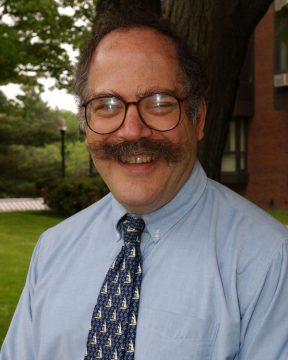William Wickner, MD, a professor of biochemistry and cell biology at Dartmouth’s Geisel School of Medicine, recently received the William C. Rose Award at the American Society for Biochemistry and Molecular Biology (ASBMB) annual meeting in Chicago.
 Named after a former president of the American Society of Biological Chemists—the predecessor organization to ASBMB—and established more than 30 years ago, the Rose award recognizes outstanding contributions to biochemical and molecular biological research and a demonstrated commitment to the training of younger scientists.
Named after a former president of the American Society of Biological Chemists—the predecessor organization to ASBMB—and established more than 30 years ago, the Rose award recognizes outstanding contributions to biochemical and molecular biological research and a demonstrated commitment to the training of younger scientists.
“Wickner’s biochemical studies are responsible for our first understanding of how proteins are transported across membranes in bacteria. His subsequent work has illuminated the processes of membrane fusion and inheritance, two fundamental problems in eukaryotic cell biology,” said Suzanne Pfeffer, PhD, a highly respected biochemist from Stanford University and former ASMBM president, who served on the nominating committee for the Rose award. “He is a consummate biochemist who deserves to be recognized for his outstanding research contributions and extremely dedicated mentorship.”
“It’s very nice to receive this ‘pat on the back,’” says Wickner. “My lab has done a lot of work over the years and it’s great to have that work recognized. This award also has personal meaning for me. When I was a young post-doc, I nominated my mentor, Eugene Kennedy, who was a very distinguished scientist at Harvard, and he won it.”
Throughout a highly impactful career that has spanned more than 40 years, Wickner has authored over 200 publications and mentored an impressive list of successful scientists—including 46 postdoctoral fellows, 17 graduate students, and 13 technicians.
Still, Wickner’s passion for his work burns as brightly as ever. “Bill is usually here before 6 am, whistling away and brimming with ideas,” says Charles Barlowe, PhD, chair and professor of biochemistry and cell biology at Geisel. “He brings a level of enthusiasm and energy to his lab and to our department that is contagious. Bill is very deserving of this recognition—I think he epitomizes what the Rose award is all about.”
When asked what he enjoys most about his work, Wickner says, “There are two things in a ‘dead heat.’ One is I actually love the work itself—I love doing the science at the bench, building the story, and seeing our understanding of it grow. And I really enjoy the people. I’ve been blessed with some wonderful young scientists who’ve gone on to run their own labs and have their own lives. That’s been tremendously gratifying to see.”
Wickner has earned a number of prestigious awards and accolades for his accomplishments and contributions to the field of cell biology. These include: being elected to the National Academy of Sciences (1996) and European Molecular Biology Organization, as well as receiving an American Cancer Society Faculty Research Award, a Guggenheim Fellowship, and a National Institutes of Health Merit Award. He is also a member of the American Academy of Arts and Sciences.